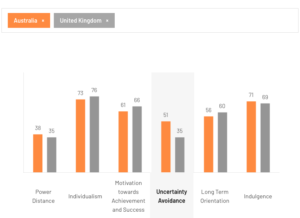
But there is more to communication than language alone. Even if they use the same words, there are significant differences between the people in different English-speaking countries. And as we discussed in another article, one of the keys to effective cross-cultural communication is awareness.
So, which differences should you be aware of English speakers in the UK vs. Australia?
Big Picture
Social scientist Geert Hofstede has expressed cultural differences numerically across a number of different dimensions. When comparing UK and Australia’s scores on these dimensions, they are by and large very similar – which is understandable. Both are Western countries with Anglo-Saxon roots and value individual expression.

Graph credit: Hofstede Insights
The only significant big-picture difference between both cultures that catches the eye is “uncertainty avoidance”. Compared to Australians, the British are more comfortable with waking up and not yet knowing what the day is going to bring.
That said, there are more differences, even if they are hard to quantify:

If you lived in Australia, wouldn’t you want to be outdoors all the time? Image source: Pixabay
Indoor vs. Outdoor
One of the most notable differences between the British and Australians is that the former spend most of their time indoors, while the latter are people of the outdoors. Since Australia has a sunnier climate than the UK, people tend to participate more in sports and exploring the great outdoors.
Because the British are more of the “indoor types,” watching the telly is a favourite pastime among them. From the X Factor to celebrity styles, the locals follow TV programmes religiously and discuss them with each other afterwards. They also love going to the movies.
Formality
Gloucestershire, England. With so much history, it’s no surprise that British culture is a bit more formal than Australians are used to
Australians are significantly more laid-back than their British counterparts. Sydney, in particular, exudes a more relaxed attitude than London. At work, both British and Australians are task focused – they like to get the job done. But Australians will tend to kick off meetings with some banter, and are more likely to strike up conversations with people they run into on the street, at the baker’s, etc.
Directness

Gloucestershire, England. With so much history, it’s no surprise that British culture is a bit more formal than Australians are used to. Image source: Pixabay
While both UK and Australian cultures have a fairly direct communication style, there are still differences. British people are more likely to understate things – and there are many examples of British understatements circulating on the internet.
The Economist even dedicated an article to it, with the below just one of many examples.
What the British say: “Very interesting”
What the British mean: “I don’t agree/I don’t believe you”
What is understood: “They are impressed”
So when speaking with a Brit, beware! What they say might just be the exact opposite of what they mean.
In short
While the UK and Australia have a lot in common, culturally, it’s good to keep in mind that there are still significant cultural differences between the two countries, and it pays to be aware of them. On the other hand, no single person is the same, so play it by ear 🙂
If you’re a confident and open-minded English speaker, you’ll find no problem getting your point across to people from both cultures. Need help with your English? Check out our English courses or find out your current English level with a free placement test.
Every small improvement makes a difference immediately. You may never be perfect, and that’s ok. Even native speakers make mistakes. But as you become more confident in your ability to communicate in English, you’ll see the benefits.
We strongly believe that confidence is built through doing. That’s why our teachers will always encourage you to take the next step. Speak out, and try to speak out faster.
Practice and application are more important. To improve your conversational skills in English, you need to “do more” and “understand less”. That’s why we focus on practical topics that you can apply at the office the next day.
Not sure which course to join?
Test your level and we will advise you.
